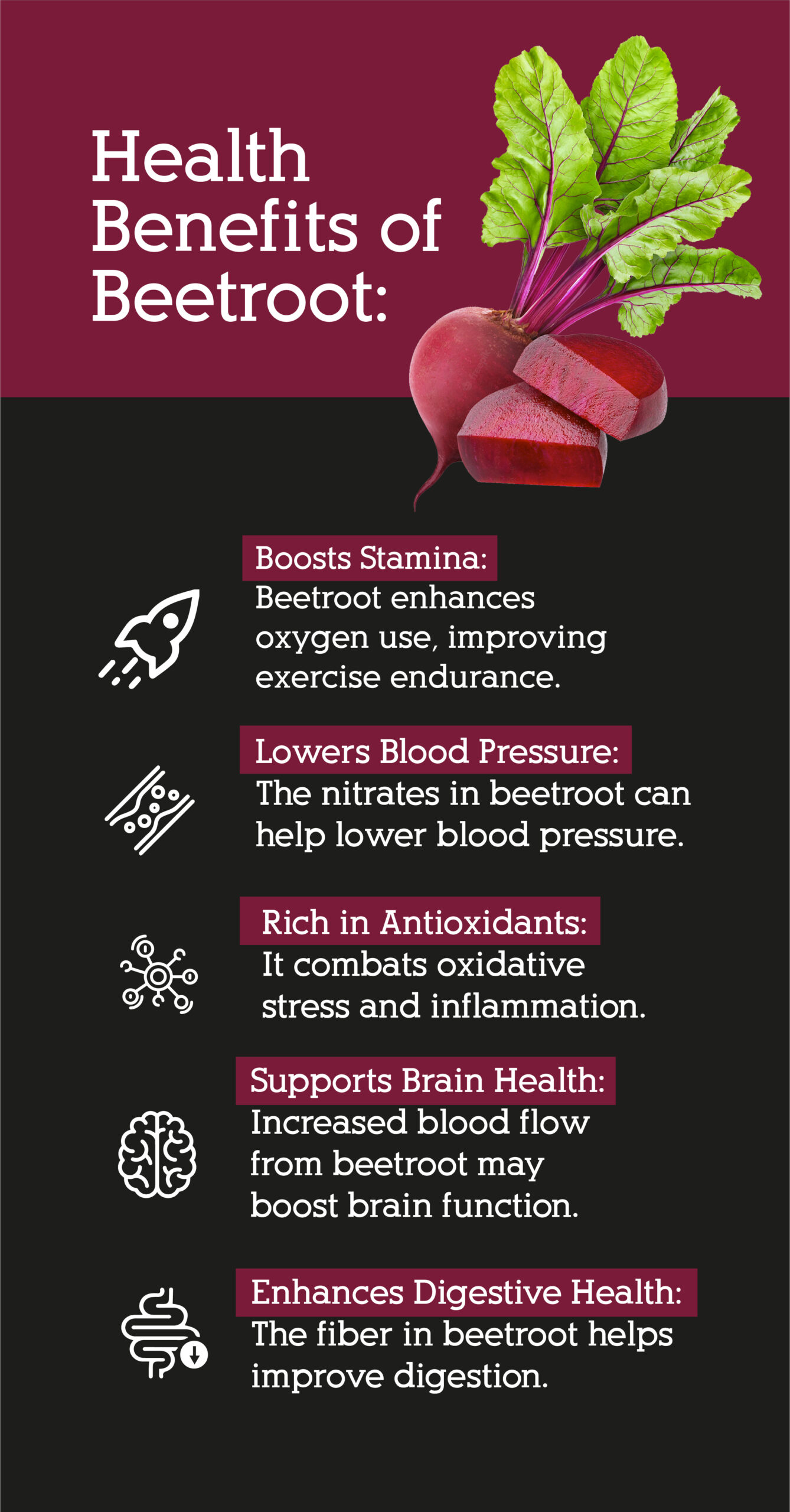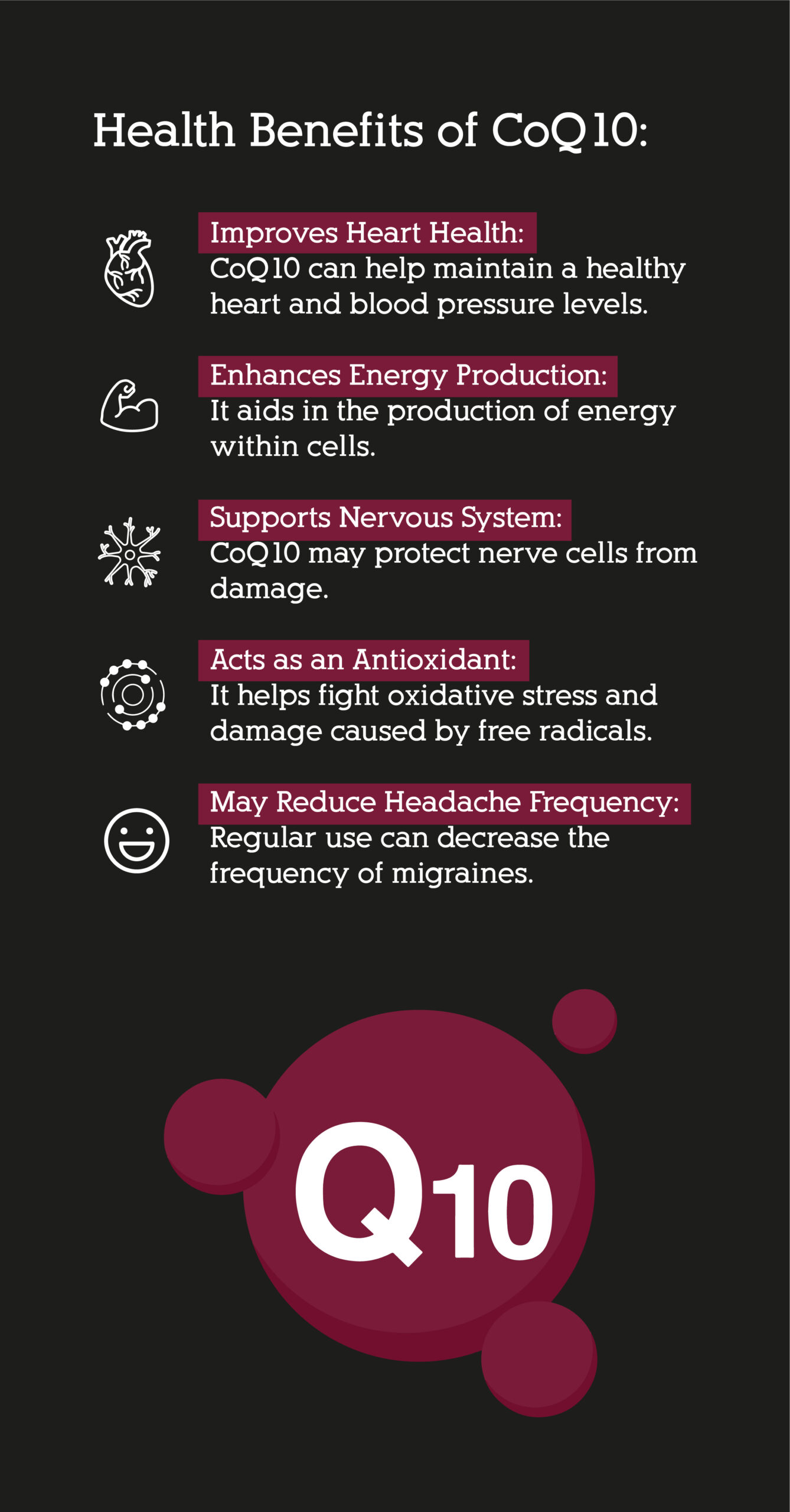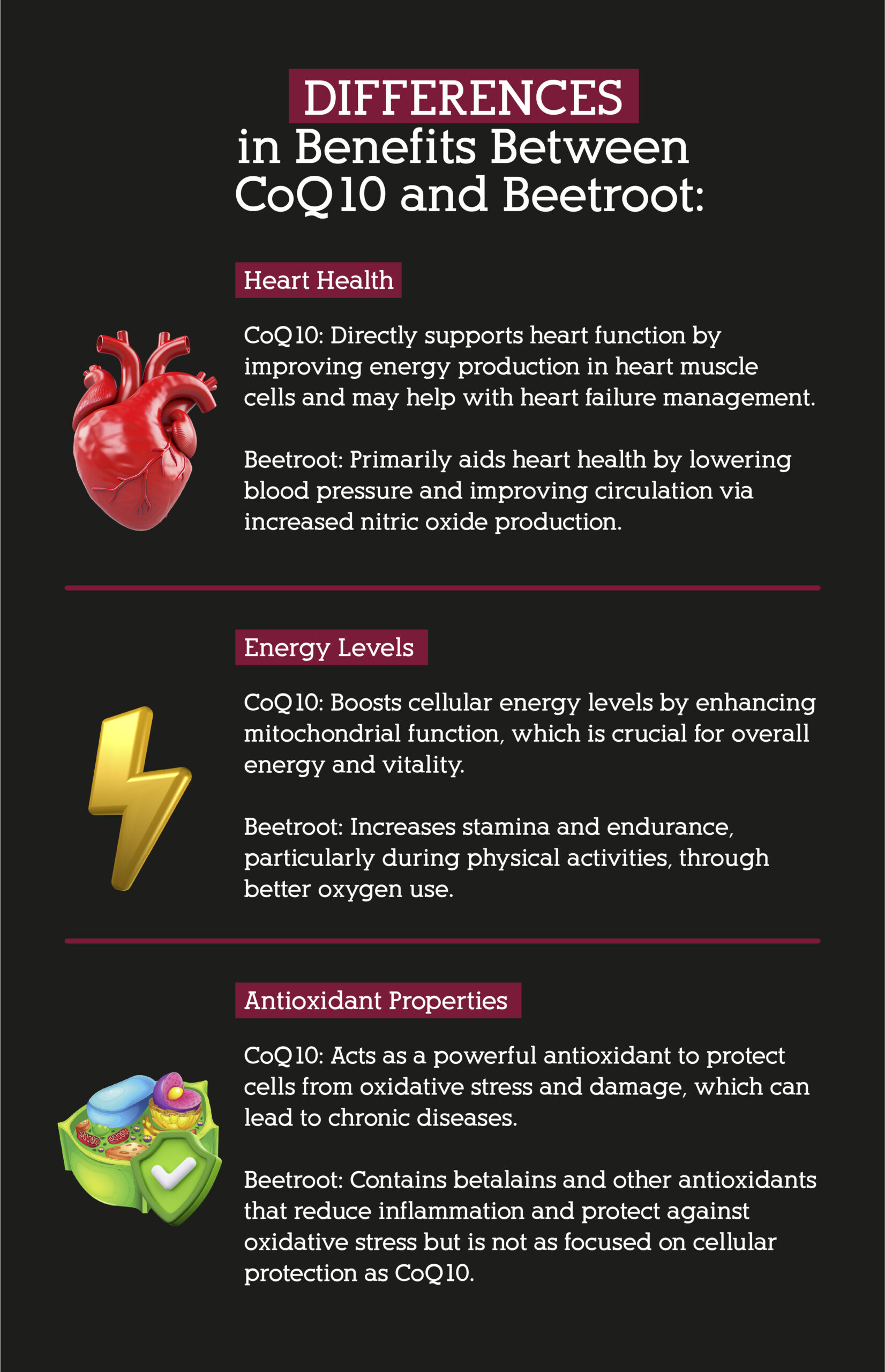Beets vs. CO Q 10: Which Champion for Blood Pressure Should You Root For?
Have you ever wondered if nature has a secret potion for naturally controlling your blood pressure? Many today turn to either beets or CO Q 10, hoping to find an ally in the battle against high blood pressure.
Are they both good? Do they both work? Do they both do the same things?
These are just a few questions we will answer.
So, let’s explore the powers of these two contenders and see which might be the most effective in keeping your blood pressure in check.
Beetroot Forms and Their Health Benefits
Whole and Natural Beetroot
Eating beetroot naturally, whether raw, cooked, or fermented, provides significant health benefits. Rich in fiber, it supports gut health and digestion. Its high nitrate content is known for improving blood flow and reducing blood pressure, making it beneficial for cardiovascular health.
Beetroot Nitrate Variability
Not all beetroots have the same nitrate levels. The nitrate content in beets can vary significantly depending on the soil composition and farming techniques used. Soils rich in nitrogen tend to produce beetroots with higher nitrate content. However, agricultural practices, such as using certain fertilizers and crop rotation methods, also play a crucial role in determining the nitrate levels in these veggies. The take away here is buying beets at the store is a crap shoot. You have no idea if they will have any nitrates at all.
Top 5 Reasons Why Store-Bought Beetroot May Lack Nitrates
- Soil Depletion: Intensive farming practices can deplete the soil of nutrients, including nitrogen, which is crucial for nitrate formation in beetroots.
- Inconsistent Fertilization Practices: Lack of standardized fertilization across different farms can lead to varying nitrate levels in beetroots.
- Harvesting Time: Beetroots harvested too early may not have had enough time to accumulate nitrates naturally.
- Storage Conditions: Long storage durations and improper conditions may reduce the nitrate content of beetroots before they reach the consumer.
- Varietal Differences: Some beetroot varieties are naturally lower in nitrates due to genetic factors.
Beetroot Juice
Beetroot juice amplifies the vegetable’s benefits, especially for lowering blood pressure and enhancing athletic performance. The conversion of nitrates to nitric oxide can significantly improve blood flow, thus helping lower blood pressure and enhance endurance. The same caveat applies to juice as to whole beets. This is all dependent on how many nitrates are present.
If you are purchasing beet juice, look at the label. Do they list nitrate count? You are looking for at least 50mg nitrates per serving. Anything less wouldn’t have much of a health effect.
Beetroot Powder
Beetroot powder offers a concentrated form of the vegetable’s benefits, including anti-inflammatory properties, thanks to the presence of betalains. Rich in fiber and antioxidants, it helps fight inflammation and support brain health. However, as with all the other forms of beetroot, if the beets are not from a great source, they will have limited nitrates and do nothing for your heart or blood pressure.
Beetroot powder is not only famous as a supplement for humans but is also used as an ingredient in dog food. Some pet food companies use beetroot powder as a cheap filler due to its low cost and high fiber content. I say this so you know that not all beetroot is high quality, so you should buy cautiously. Look for a nitrate count; if none exists, it’s probably poor quality.
Studies on Beetroot’s Health Benefits
Numerous studies have underscored the health benefits of beetroot, particularly its ability to lower blood pressure, reduce inflammation, and protect against oxidative stress and inflammation. Again, nitrates are vital components here, so always remember, it’s not just the beet; it’s what’s in the beetroot! The nitrates produce nitric oxide (no), opening your veins and arteries and stimulating the immune system.
Studies on Beets
In a detailed article published in the National Center for Biotechnology Information (NCBI), researchers delve into the cardiovascular benefits of the dietary nitrates found in beetroot. The study explains that these nitrates help lower blood pressure and improve overall heart health by enhancing the body’s nitric oxide production. This compound is crucial for dilating blood vessels and improving blood circulation. The findings support the potential of nitrates as a natural, non-pharmacological option for preventing and managing heart diseases.
You can read more about this research here.
There are literally thousands of studies on beets and nitrates and all their benefits.
Beets in Summary
In summary, beets are good for your heart and blood pressure only when they contain nitrates. Nitrates create nitric oxide, which acts as a blood vessel opening agent, lowering your blood pressure, among a massive list of other benefits. Beets work when they are high quality, from suitable farms, places, etc. They work to support heart health, have been proven to do so by science, and are incredibly safe to use.

What is QO Q 10?
Coenzyme Q10 (CoQ10)(CO Q 10), also known as ubiquinol, is a naturally occurring antioxidant that plays a crucial role in cellular energy production. It is found in every cell of the body, where it helps convert food into energy. CoQ10 was discovered in 1957, Fredrick L. Crane and colleagues at the University of Wisconsin–Madison Enzyme Institute. The name “ubiquinol” comes from “ubiquitous,” reflecting its widespread presence in nature and the human body, thus reflecting its vital role in various biological functions. CoQ10 is also crucial for heart health and has been studied for its potential in treating multiple health conditions.
Co Q 10 has shown promise in studies exploring its effects on human blood pressure. A research synthesis found that CoQ10 supplements can significantly reduce systolic and diastolic blood pressure, particularly in individuals with elevated levels.
For example, a study cited in the SelfDecode Health report highlighted that CoQ10 supplementation was associated with a decrease in systolic blood pressure by 3-4% and diastolic blood pressure by 0.4-2% in individuals with slightly high blood pressure.
This positive effect is thought to be due to CoQ10’s role in enhancing blood vessel function and overall cardiovascular health, demonstrating its potential as a supplementary treatment for managing hypertension.
How COQ10 Works
Coenzyme Q10 helps improve heart function through several mechanisms:
- Energy Production: Co Q 10 is crucial in the mitochondrial energy production process. It helps convert the energy from carbohydrates and fats into ATP (adenosine triphosphate), the form of energy that cells use for most of their functions. This is particularly important in the heart, where energy demand is high.
- Antioxidant Protection: Co Q 10 is a potent antioxidant, protecting cells from oxidative damage caused by free radicals. This is essential for maintaining the health of the heart’s cells, as oxidative stress can lead to cardiovascular diseases, including hypertension and heart failure. It may also help extend the life of nitric oxide, meaning it plays very well with beets!
- Enhancing Blood Flow: Co Q 10 can help improve the endothelial function of blood vessels, leading to better circulation. It helps blood vessels to relax correctly, allowing for improved blood flow throughout the body, including the heart. This reduction in vascular resistance is one way in which CoQ10 can help reduce blood pressure levels.
- Reducing Oxidative Stress: By combatting oxidative stress, CoQ10 helps preserve the body’s nitric oxide, a compound essential for blood vessel dilation. This contributes further to lowering blood pressure and improving heart health.
These effects collectively contribute to CoQ10’s ability to support heart function, making it a valuable supplement for those looking to maintain cardiovascular health or lower BP.

So, do they both work? Are both beets and COQ10 beneficial? How do beets differ from COQ10?
Beets and CoQ10 are both beneficial for health but function differently and offer distinct benefits:
- Beets: When high in dietary nitrates, beets help enhance blood flow and lower blood pressure by increasing the production of nitric oxide, which relaxes and dilates blood vessels. This can improve cardiovascular health, athletic performance, energy, etc. Beets are also rich in antioxidants and fiber, which support overall health, including digestive and inflammatory processes. But, again, for beets to really pack a punch, they need nitrates.
- Coenzyme Q10 (CoQ10): Known for its role in energy production and as an antioxidant, CoQ10 is crucial for the functioning of cells, especially in the heart. It helps improve energy production in cells, protects against oxidative damage, and may benefit conditions like heart disease and hypertension. CoQ10 also supports endothelial function, which can help maintain healthy blood pressure levels.
While both beets and CoQ10 support cardiovascular health, they do so through different mechanisms and are not directly substitutable for each other regarding their effects. Beets primarily enhance blood flow and reduce blood pressure through nitrate conversion, whereas CoQ10 contributes to energy production and antioxidant protection.
They are both great additions to any supplement regime and work well if you use the right kinds and sources, especially for beets.
We recommend the following beetroot supplement as it has over 100mg of natural nitrates.

